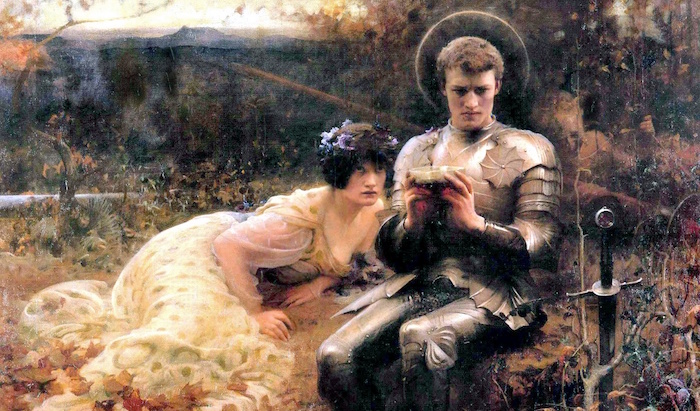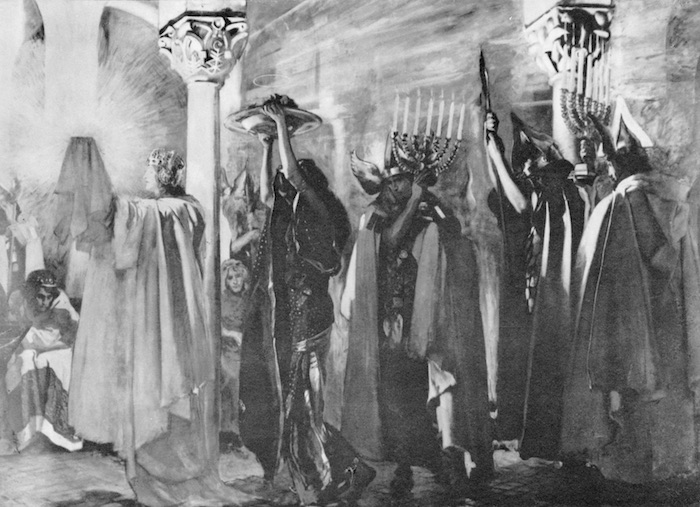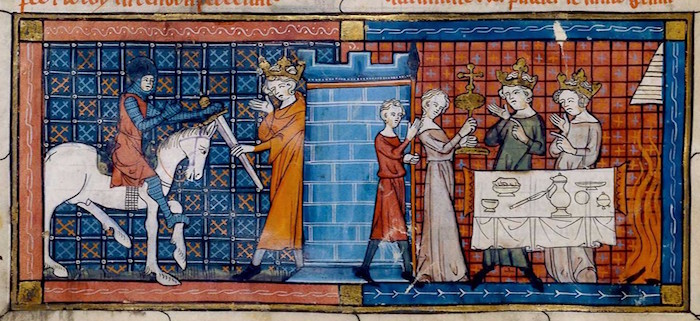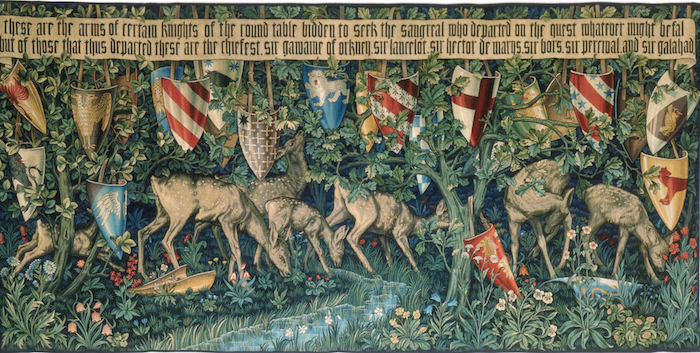A remote castle that appears and disappears at will. A bedridden lord who lives like an emperor. And an unknown inhabitant with possibly supernatural attendants – the grail castle in the 12th-century Arthurian tale Perceval is a great way to inject a bit of adventure on the road in your fantasy campaign. On the way to something else, your PCs stumble upon this strange keep. They enjoy a brief but satisfying mystery, and continue on their way. It’s a great ‘stopover’ adventure – a palate cleanser – before you continue your campaign’s central plot.

The castle itself is beautiful. Perceval’s author, Chrétien de Troyes, describes it as the loveliest keep between England and the Holy Land. But despite its beauty, it’s not marked on any maps. It shows itself only when it wants to. It’s not clear whether the castle’s lord, the Fisher King, has any control over its appearance and disappearance, or whether the matter is left entirely up to God.
The Fisher King himself is an interesting figure. He was crippled in battle by a javelin through both thighs, and can no longer ride a horse. His chief comfort is going fishing in a small boat on a river near his castle, because he can sit (or lie down) while doing it.
If you’re going to have the castle appear to your PCs, first give them the opportunity to encounter the Fisher King out on his boat. When fishing, he dresses like a peasant, and wears a blanket across his legs. He’ll happily chit-chat with the PCs, shouting from his boat to the shore, but won’t identify himself. If they need directions, he points them to a nearby castle (his). Observant PCs may notice the castle doesn’t appear on their maps.
When the PCs approach the keep, they’re greeted by squires who come out to take their horses and armor. Attendants show them into the great hall. The space is enormous. It’s built around a central fireplace so large that four hundred knights could sit around it comfortably. The Fisher King greets them here. PCs might recognize him from the river, and even wonder how he reached the castle before they did. He’s lying in a bed near the fire and apologizes for not rising to meet the party.
The Fisher King treats the PCs to a marvelous feast. The meal is served on a broad table made from a single sheet of ivory, resting on ebony trestles. This is remarkable, since ivory does not come in broad sheets. The food is suitable for an emperor: peppered venison, dates, figs, nutmeg, cloves, pomegranates, and for desert, a host of powdered medicines mixed with honey. The drink deserves a mention for its variety too: claret, dry wines, sweet wine, mulberry wine, and syrup.

Once during each course of the meal, a line of squires and attendants parades through the hall. They walk between the Fisher King’s bed and the fire, then leave through another door. All the squires and attendants are exceptionally, almost supernaturally beautiful, and richly attired. One carries a pure white lance whose tip secretes drops of blood. One carries a silver carving platter. Two carry candelabras. And one carries a grail: a sort of wide bowl. It’s made of gold, decorated with precious stones finer than any others in the world. When the grail appears, it illuminates the room so brightly that candle flames can no longer be seen, like stars when the sun is out.
It’s important to note before we go further that the grail in Perceval is merely a grail which is holy, not the Holy Grail. The earliest known reference to the Holy Grail, the cup from which Christ drank at the Last Supper and in which Joseph of Arimathea collected the Holy Blood at the crucifixion, comes from a story written ten years after this one.
In Perceval, the hero never asks what’s going on. Had he done so, the Fisher King would have been cured of his injury. Sir Perceval wasn’t pure enough to be worthy of asking the question, though, so God stops his lips. This plot point is weird in a book, and totally unworkable in an RPG. Instead, at your table, the Fisher King may decline to answer any questions about the parading attendants. He may even go so far as to claim he doesn’t see anyone, that he isn’t sure what the PCs are talking about. What’s important is that he doesn’t resolve the mystery of who’s being served so grandly in the other room.
When the PCs wake in the morning, the castle is completely deserted. There’s no Fisher King, no squires, no maidens, no servants. The PCs’ gear is all laid out for them and their mounts are saddled. As soon as they cross the drawbridge, unseen hands raise it behind them. Once the castle is out of sight, if they return, they find no evidence it was ever there.

So what on earth is going on? In Perceval, it turns out there was someone in the room the attendants were parading into: the Fisher King’s father. The old man was also Sir Perceval’s uncle, making the Fisher King Perceval’s cousin. The attendants were feeding the old man, explaining the need for a carving platter and a grail. But they weren’t feeding him normal food. Instead, they serve him a single eucharist host (wafer) from the grail every day. Thanks to the holiness of the grail, this daily bread has been enough to sustain the old man for twelve years. In all that time, he has never left his chamber.
In an RPG sense, this suggests the grail is a magic item. A single host served from it will keep the eater alive for 24 hours, no matter how grievously wounded or ill she is. In your setting, you might replace the host with some other sacramental food or with holy water.

At your table, the adventure hook in this strange castle is figuring out who the heck is being fed from the plate and grail. The PCs are eating a feast fit for an emperor, but someone else in the castle is living so much larger than the Fisher King that he or she is eating off tableware that looks like that, has attendants that look like that, and is so high in station that he or she treats this grand hall like a servants’ passageway! What is going on?
The answer from Perceval is doable in an RPG context: the mystery diner is a long-lost relative of one of the PCs, being kept alive by holy magic. Finding a cure for the relative’s condition is an obvious plot hook that grows out of the discovery.
But you may want to leave this castle as a self-contained encounter, not a stepping stone to further adventures. In that case, if the PCs snoop, they’ll discover the mystery diner is a faerie queen. Faeries are not out of place in Arthur stories (in some tellings, Arthur’s birth was attended by faeries), and they’re certainly appropriate for castles that appear and disappear mysteriously! In a lot of tellings, because faeries aren’t Christians, when they die, they go to Hell. So this one is using the magic of the grail to cling weakly to life. She still has power enough, though, to deal with the PCs if they enter her bedchamber. Their behavior here matters. If the faerie queen finds the PCs entertaining or intriguing, she may grant them a boon, like raising the dead, bewitching a distant NPC, or summoning a servitor at the time and place of their choosing. If, however, she finds them insulting, offensive, or – worst of all – boring, she curses them. She might make one of the PCs hideous, strip one of them of all memories of something he swore to protect (but not memories of that oath), or prophecy that one PC’s actions will unknowingly betray a friend to her death.






